The Israeli LGBT community is increasingly visible in all facets of cultural and social life, but they are still seeking rights in a country whose relationship with gays continues to evolve.
“The professional gay sweetheart of the state” is how a recent cover story in Time Out described Assi Azar. He is Israel’s gay best friend, Yanir Dekel writes, “a guy who’s fun and cute and funny and goofy,” a ubiquitous media presence and integral and beloved part of Israeli popular culture.
The co-host of Big Brother and a morning show on Radio Tel Aviv 102FM, Azar is also outspoken on LGBT rights. He made a documentary, Mom and Dad: I Have Something to Tell You, about how both parents and children experience coming out. He attends events and demonstrations in support of gay rights, and liaises with Knesset members to raise awareness of the problems facing LGBT schoolchildren. Azar also uses his social media platform to vocalize his political opinions, recently attacking MK Stav Shaffir for, in his view, “exploiting the gay community in a cynical and disappointing way” over the issue of civil unions.
Azar’s fame, coupled with his unguarded private life and outspoken political views, says a good deal about the tolerant nature of Israeli society in 2014, a place where the notion of live and let live as far as personal lives go is accepted by the majority of the public. But it has also been found that 43 percent of Israelis believe homosexuality is morally unacceptable and that 30.5 percent of Israeli Jews and 46.2 percent of Israeli Arabs would be bothered by having a homosexual couple as neighbors. Moreover, as the Association for Civil Rights in Israel reports, “The LGBT community still faces various forms of discrimination by government authorities and in the private sector.”
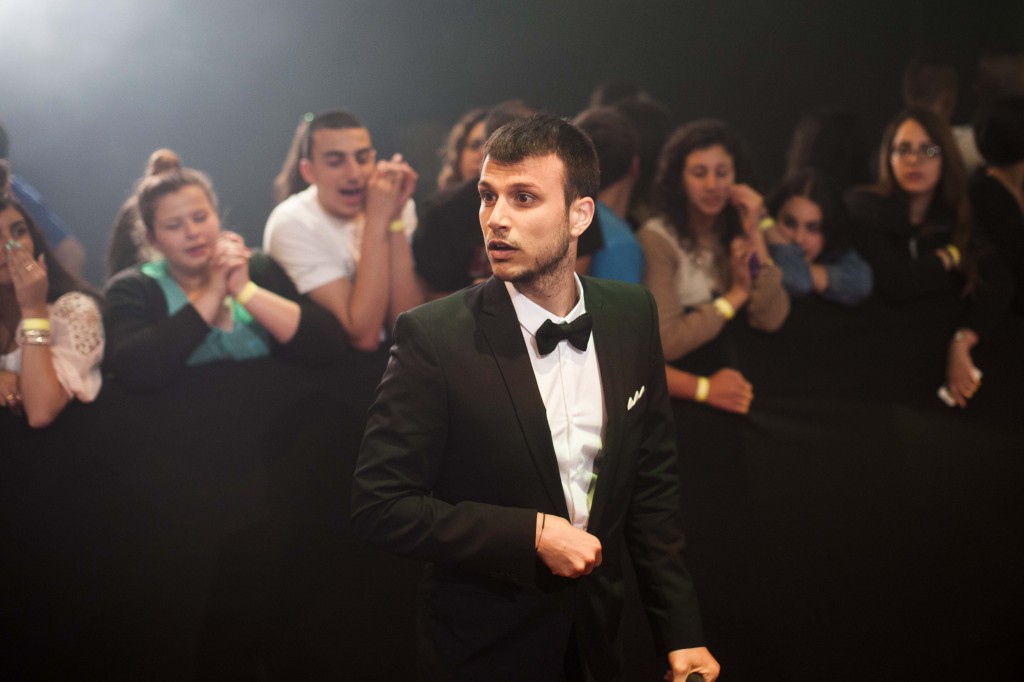
Assi Azar stands outside the Big Brother house during the opening of the show’s fifth season. Photo: Yonatan Sindel / Flash 90
Azar’s prominence in popular culture within a society where homophobic attitudes remain deeply embedded in certain sectors is but one example of the triumphs and tensions that come with being gay in Israel today. Many of the basic rights for LGBT people have already been won, but formal legal equality, especially on the issue of marriage, remains elusive. Tel Aviv is today one of the most gay-friendly cities in the world, but in Jerusalem—just one hour down the road—it is almost impossible to be gay and live openly.
Being gay in Israel, then, is to be witness to a series of contradictions, paradoxes which show that Israel is in many ways a multicultural society within which LGBT people—not only celebrities—have been able to find a place for themselves.
Assi Azar is only one example of how LGBT people have integrated themselves into contemporary Israeli culture and society. Ivri Lider, Harel Skaat, and Yehuda Poliker in music, Eytan Fox and Yariv Mozer in film, Nitzan Horowitz, Yaniv Weizman and Etai Pinkas in politics, the author Yossi Avni-Levy, the actress and comedienne Orna Banai, transgender Eurovision winner Dana International—these are but a few examples of the proliferation of gay people within the culture. This does not even account for the numerous out people in the military and police, education and science—faces and voices that, when it comes to the mainstreaming of homosexuality in Israel, are just as important to the struggle as Assi Azar and Ivri Lider.
“You cannot underestimate the importance of this phenomenon,” Etai Pinkas, gay rights activist and member of the Tel Aviv-Yafo municipal council, told me. “The act of people coming out has an influence on everything” related to LGBT rights, including moves towards marriage, adoption, and surrogacy, as well as “a dramatic influence among the general society. It helps legitimize and increase support for LGBT people.” It’s a two-way street: that Israel has a “liberal and open society” means it can have a culture where the concentration of gay people in politics, arts, and sciences is among the highest in the world, Pinkas concluded.
This is not to claim that the experience of being a gay public figure is universally easy. I spoke with Idan Matalon over the phone from the offices of Moovz in Tel Aviv. Moovz—which can best be described as Facebook for gays – addresses not an Israeli need but a “global need,” Matalon told me, to “provide a space for gay people who otherwise don’t have a place to express themselves, to share their thoughts” and to meet other people and make friends. It has been particularly successful in Asia and Latin America—places, in other words, without public spaces for LGBT people.
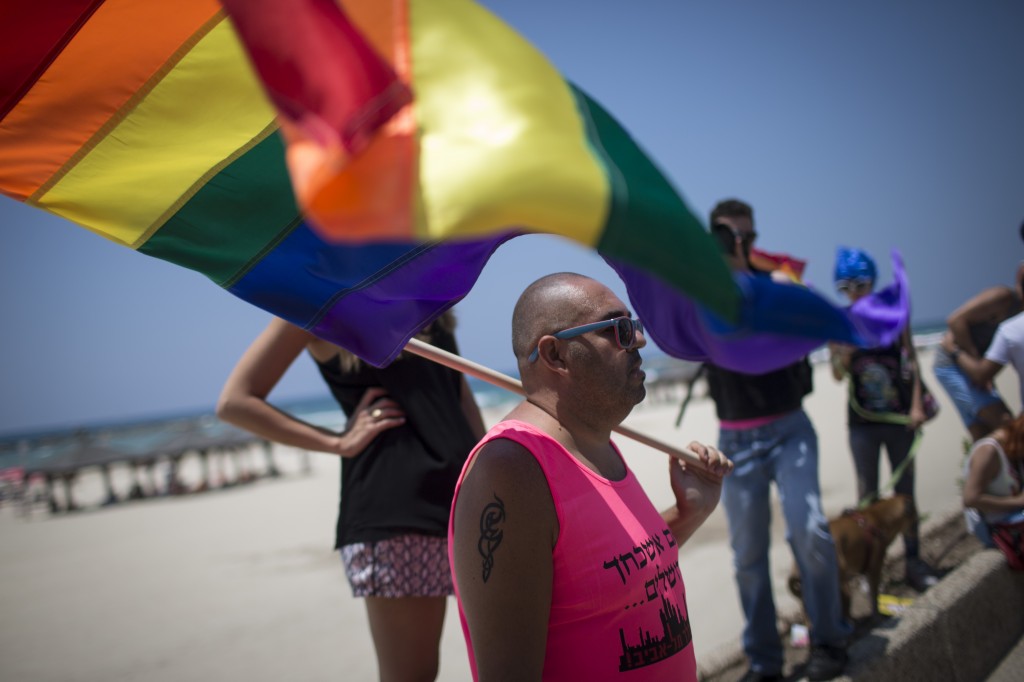
The 2014 Tel Aviv Gay Pride Parade marked a record attendance of 150,000 people from Israel and abroad. Photo: Hadas Parush / Flash90
Matalon, who started out as a YouTuber and is now also a columnist on LGBT issues for the news website Mako, told me about his experience of coming out to his parents. “It was very spontaneous, I didn’t expect to tell them,” he said. Living at the time in his family home in Gan Yavne near Ashdod, over dinner “I told my parents I was going to Tel Aviv with my girlfriends. I said I was driving and my mom asked why I was driving and why I always drove.” Over time, the tension built up over the table as Matalon tried to conceal what he was actually up to in Tel Aviv. Eventually he said, “I guess you have a gay son.”
After posting a version of his coming out story onto YouTube three years ago, Matalon received many responses from Israelis who has been through similar experiences. I asked him whether, based on these comments, he thought his coming out reflected the Israeli gay experience. “I have to say coming out was easier for me,” he said. “I got the support that I needed from my family and it was easier for me to express myself. Everyone was very accepting,” including his father who has since become very concerned about LGBT rights.
“It’s a process, people see [LGBT people] more and more: as funny people, serious people, as members of Knesset, city councilors, businesspeople—they see them everywhere. More and more so, people are coming out,” MK Nitzan Horowitz told me, stressing how important it is to see someone like Assi Azar on television, because they become in turn a role model for other Israelis, particularly those yet to come out themselves.
I get many reactions like that, parents who tell me that when I see you, a person who’s very successful, we feel better about our own kids who have come out and feared they would have problems. People have strange images in their heads, but then they see that gay people occupy important positions, they’re serious people, they’re like everyone else. It’s reassuring to have this visibility.
This is why it’s very important to hold Gay Pride, to have public events, to have extensive media coverage, to have people on television, on the radio, to help other people who are afraid, who feel intimidated. They see that it’s not so bad, it’s not so frightening, it’s absolutely okay being gay, you can be popular, you can be successful. This is why we encourage people to come out because it helps us a lot, particularly positive role models like artists, singers, football players, officers, scientists, teachers, policemen, and so on. This is the real change and it’s happening all the time.
Gil Kol, spokesperson for The Aguda—The Israeli National LGBT Task Force, said that gay people in the public sphere “is of major importance because you can’t love a person and appreciate their art and at the same time hate them for who they are.” Kol, however, wishes that in the future, whether a singer or an actor is straight or gay will be a “non-issue,” adding, “I don’t want a person to be a gay celebrity—I want them to be a celebrity who is gay.”
Attitudinal changes in society towards LGBT people and their rights can be viewed as a pan-Western trend, but it is an evolution that occurs at differing paces in different places. In Israel, therefore, there must be a way to account for the proliferation of openly gay public figures in the culture and the tolerance that exists within society for LGBT people.
It is certainly true that, within a small and close nation like Israel, the influence of large institutions like the military extends far and wide and can be a catalyst for change. Uzi Even—who spoke to me over the phone from his home in Tel Aviv—was at the heart of the struggle for the acceptance of gays in the military, revealing at a Knesset hearing in 1993 that, in 1982, he had been fired and had his security clearance removed after his superiors discovered he was gay.
“It was a glass ceiling that I had to break,” Even, a professor of physical chemistry and a gay rights activist, told me of his testimony, which helped introduce “a complete change of policy, one that is non-discriminatory in every way” towards LGBT people. “The army is a highly appreciated institution in Israeli society,” and allowing homosexuals to serve in the army not only helped alter perceptions among ordinary people, but “opened the way to changes in other government organs like the Ministry of Foreign Affairs.”
The role of Tel Aviv also cannot be discounted. Compared to Jerusalem, which is the religious center of Israel, “Tel Aviv adopted a different, more progressive atmosphere built on the legitimatization of and openness to diversity,” Etai Pinkas told me. “Tel Aviv is a secular city with a sense of culture and it is a place that cares about higher education.” Not only does it draw in LGBT people from around Israel, he said, but “Tel Aviv influences other parts of the country, leading the people’s tastes,” as London does in the United Kingdom or Paris in France.
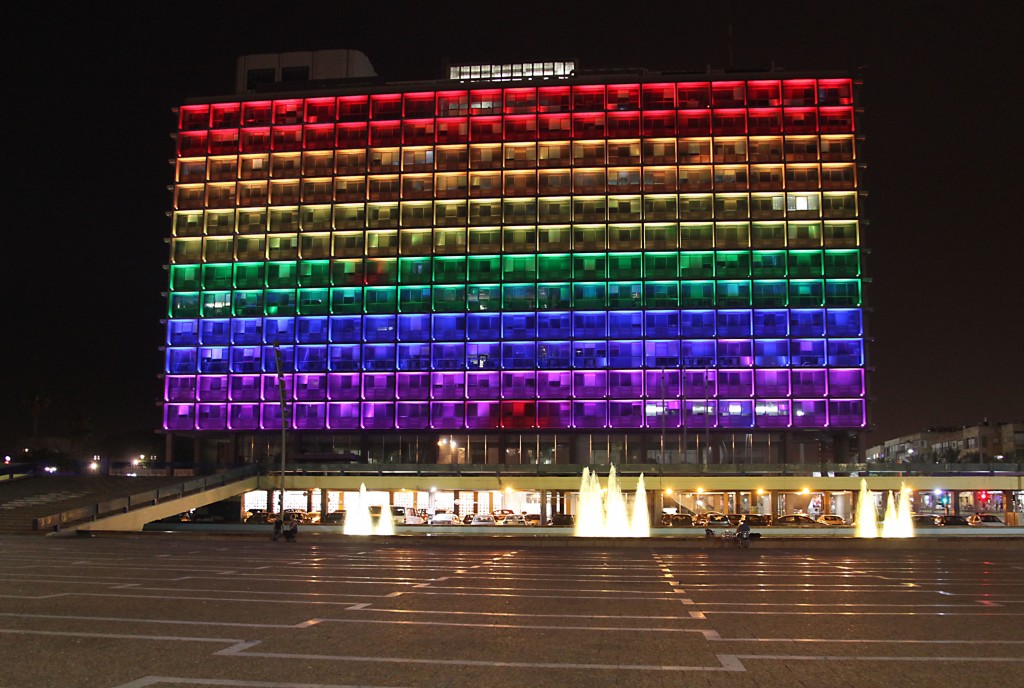
The Tel Aviv municipality building, at Rabin Square, is lit with the colors of the Pride flag ahead of Tel Aviv Gay Pride Week, June 8-14, 2014. Photo: Gideon Markowicz / Flash 90
What defines Tel Aviv is that LGBT people are not confined to a gay ghetto. As Itay Hod explained in The Daily Beast, there is no specific gay neighborhood—rather, gay and gay-friendly venues are sprinkled across the city. Gay people are everywhere, and the screenwriter Avner Bernheimer told Hod that this closeness and interconnectedness begets tolerance. “Israel is a small country where everyone knows everyone. Everybody knows someone who’s gay, whether it’s your son, your neighbor’s cousin, or your best friend’s lesbian daughter.”
“These are the values that we are trying to promote in this city,” Tel Aviv mayor Ron Huldai told the BBC regarding LGBT rights. Tel Aviv and Tel Aviv Pride “is a symbol of democracy and pluralism and tolerance, art, culture, and being a home to every minority,” including LGBT Israelis. Part of Tel Aviv’s success has also come from a conscious attempt by the municipality to promote Tel Aviv around the world as gay-friendly. Tel Aviv’s place as the gay center of Israel is a product of organic changes among people in the city as well as political support from the local authority.
LGBT Israelis achieved equality in certain spheres earlier than other Western nations; the place of LGBT Israelis in legislation has improved their position in society and culture, and vice-versa.
It began with the decision in the early 1960s to cease enforcement of the law on sodomy. Israel banned employment discrimination against LGBT people in 1992, and in 1993, as mentioned, the rules of the IDF were amended to allow gays to serve openly in the military. Adoption was opened up to same-sex couples in 2008. In August of this year, the Interior Ministry amended the Law of Return, extending its applicability to non-Jewish same-sex partners of Jews making aliyah.
But the political picture is still complex; LGBT Israelis have long faced problems in securing their rights through legislation. Back in May, the Hebrew University of Jerusalem hosted its Gay Pride Week, part of which was a panel discussion involving MKs Stav Shaffir (Labor), Adi Kol (Yesh Atid), and Tamar Zandberg (Meretz). In his weekly column in Haaretz, Yossi Verter captured one moment that was particularly illuminating.
After mentioning that Yesh Atid had killed Shaffir’s bill on civil unions six months previous, Kol said to Shaffir, “Stav, you are a member of the Finance Committee. You see how much money we have to transfer to the settlements so that Habayit Hayehudi will pass laws for us.” “So what will be the price tag for the civil union law?” Shaffir asked. Kol offered no number.
In a representative democracy where 43 percent of people believe homosexuality to be morally unacceptable, the Knesset can only be in some fashion a reflection of moral attitudes in society. The LGBT community has allies across the secular political spectrum, including Limor Livnat, Gideon Sa’ar, and Ofir Akunis in the Likud and Orly Levi-Abekasis in Yisrael Beiteinu. But while parties favorable to the LGBT community—such as Yesh Atid, Hatnua, Labor, and Meretz—have a strong representation, socially conservative Orthodox and Arab factions have their share of seats, too.
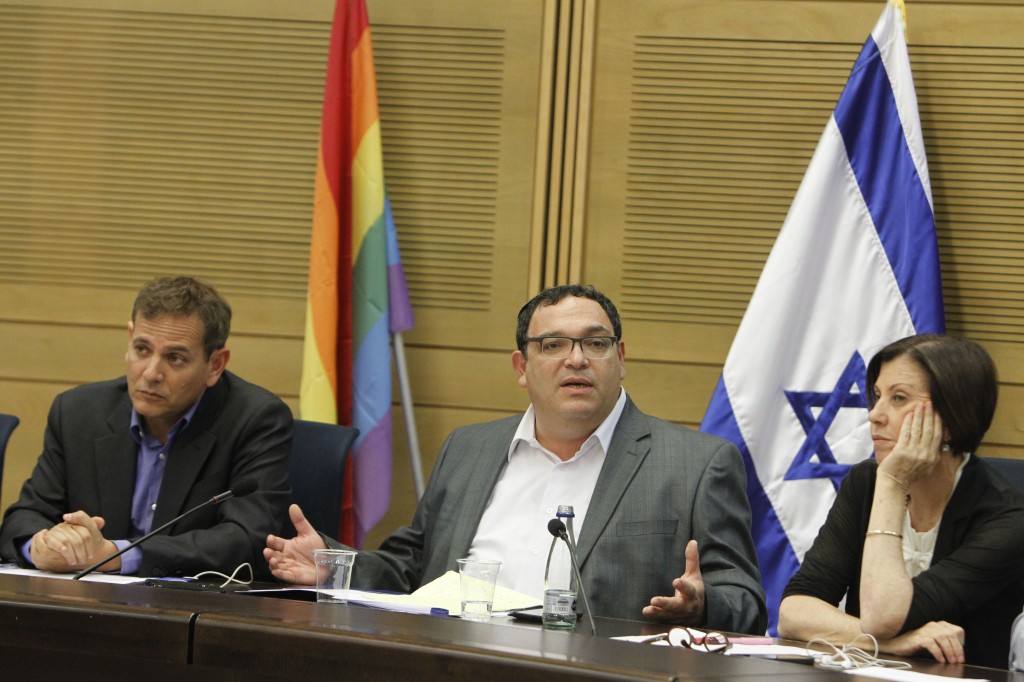
From left to right: Members of Knesset Nitzan Horowitz (Meretz), Minister of Education Shai Piron (Yesh Atid), and Zahava Gal-On (Meretz) in a special on LGBT issues in June 2013. Photo: Miriam Alster / Flash90
Getting something done on LGBT rights, then, requires compromise. Adi Kol recently co-sponsored a bill that would have granted same-sex couples with children equal access to tax credits to which heterosexual couples are entitled. Habayit Hayehudi objected, claiming explicit references in legislation to same-sex couples constituted an alteration of the status quo, opening a door to same-sex unions. In the end, the bill was shelved after the first reading, and the Israel Tax Authority published a directive opening up access to these credits for same-sex couples.
Tax credits are merely one example of how LGBT Israelis have what Gil Kol described to me as informal as opposed to formal equality. For example, gay and lesbian couples in Israel “don’t have marriage rights, but we have an instrument called ‘known in public’”—yeduim batzibur, unregistered cohabitation where two people who live together are entitled to the same rights as wedded couples. “But that’s not equality,” Kol said, for so long as the state only recognizes the right of heterosexual couples to marry in Israel.
Similarly, Kol highlighted inequality in the law on surrogacy. At this present time, only heterosexual couples are entitled to make use of a surrogate mother in Israel in order to bear them a child. Gay couples have to turn abroad to find a surrogate—an elaborate, expensive, and bureaucratic procedure involving mothers in places like India and Thailand. Health Minister Yael German is sponsoring legislation to open up surrogacy in Israel to same-sex couples, although he stressed that while the matter is “being addressed, we are not yet sure of the outcome.”
“When the law itself doesn’t recognize you as equal,” when LGBT citizens are covered by Supreme Court edicts and government regulations, “it puts you in a place below that of a heterosexual person,” Gil Kol concluded, “and we’re not willing to accept that.”
I met Nitzan Horowitz on a Thursday lunchtime in May at Tolaat Sfarim, a bookstore-café on Rabin Square in Tel Aviv where he was holding court. “They reflect a certain part of society which is very conservative,” he told me when I asked him about the issue of the religious parties in the Knesset, “and they block all our attempts to change legislation. I don’t blame them because this is part of their platform. Rather, I blame their non-religious partners who go along with them. If Netanyahu were more committed to gay rights, no doubt he would succeed in influencing the religious parties. It’s his fault and his responsibility.”
Horowitz is not as impressed by the current government as some activists within the gay community are. “There were a lot of headlines and public campaigns,” he said of Yesh Atid and Hatnua’s initiatives, “but so far, if we examine the law, almost nothing has changed. Nothing. There [were] bills that were proposed and maybe came to an initial vote but they never passed through the entire legislative process. It creates an illusion as if things are advancing but in terms of legislation nothing has really changed.”
Horowitz, who has been a member of Knesset for Meretz since 2009, is at present the only openly gay member of Knesset. He is presently also chair of the Knesset’s Gay Pride Lobby (along with Yesh Atid’s Ofer Shelah). He follows Uzi Even, who became the first openly gay member of Knesset when he was sworn into office in October 2002 (again, for Meretz).
“When I first entered the Knesset [in 2009], there was a very strong opposition from the religious parties to the point where they would refuse to talk to me,” Even told me. Indeed, on the day Even was sworn in, members of the right-wing religious parties left the Knesset chamber in protest, although “the members of the liberal parties treated me like any other member of Knesset.”
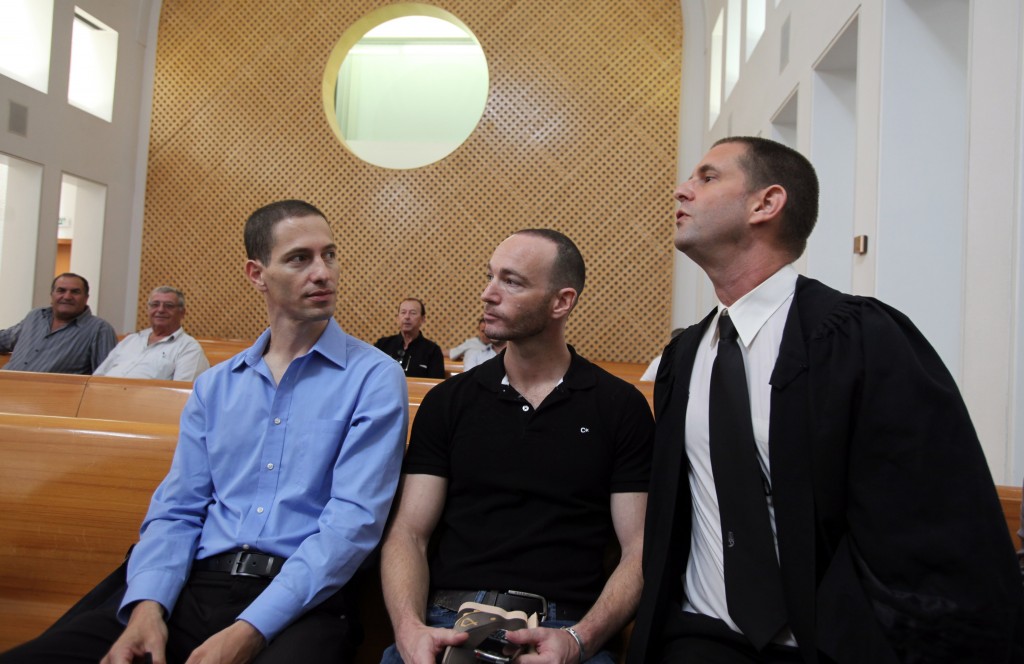
Etai Pinkas (L) and Yoav Arad (middle), with their attorney Dori Spibak (R), petitioned the Supreme Court in 2010 to be permitted to have a baby through a surrogate mother. Photo: Yossi Zamir / Flash90
(Even did recall one interesting episode where an Orthodox head of a Knesset committee, initially uncomfortable with the idea of accepting Even as a member, decided to allow him in on the basis that although he was gay, at least he wasn’t Reform.)
Even lost his seat six months after entering the Knesset in the 2003 elections, when Meretz were reduced to six seats. Although only six years passed between his departure and Horowitz’s arrival, he said the way in which Horowitz was able to enter government without rancor and demonstration did not surprise him. But “I had to take the first step,” he said.
“I came out many years ago so, for me, it was a natural process,” Horowitz told me when I asked about being out as a public figure.
As a young journalist, I was already out to my family, my friends, my colleagues at work. So I just kept going and the issue never came up, there was never a conflict about it because I began my career being open. To everyone, it was clear I was gay and there was no problem about it.
When I travel the country and meet all kinds of people, there isn’t a problem at all with me being gay, never. I have never had any problem with it. So if other people would like to learn from my experience I would say the problem, most of the times, is with yourself, most of the time, and once you come out you discover nothing really changes.
Being gay, Horowitz thinks, is part of life today in Israel—“’You’re gay? So what?’ Usually from my experience people have problems with themselves and once this is settled, and especially when you’re a public figure in a more or less tolerant environment, there’s no problem.”
Nitzan Horowitz is, in many ways, a model of what it is possible to achieve as a gay man in the Knesset. But for activists and members of the LGBT community, a continued source of disappointment and even embarrassment is a man referred to (in a column by Aeyal Gross in Haaretz in March last year) as Mr. X.
As Gross revealed, Mr. X joined the Knesset in January 2013. He is out to his friends and family, attends gay parties, and brings his partner to functions, but has made a deliberate choice to hide his gay identity during his public career. He has abstained on key votes on matters of interest to the LGBT community (much to the chagrin of community activists and party colleagues).
I confirmed the identity of Mr. X with multiple sources—indeed, more than once his name was given to me unprompted. When I put it to Uzi Even that Mr. X’s homosexuality is an open secret in Israel, Even replied, “How can it be a secret when everybody knows?” In an interview with the newspaper Globes, the journalist and activist Gal Uchovsky said that members of the community have been asking him why Mr. X hasn’t yet been outed.
Uchovsky’s reaction was to say that if Mr. X wants to remain in the closet, “He will die in the closet, it’s his punishment. As a loser in the closet, he isn’t worth anything, his political career is finished. Today, people who choose to remain in the closet only do harm unto themselves. On the one hand, I really care and it annoys me, and on the other hand I do not care.” If Mr. X wants to live a closeted life, “let him choke on his own bad smell,” he bitterly concluded.
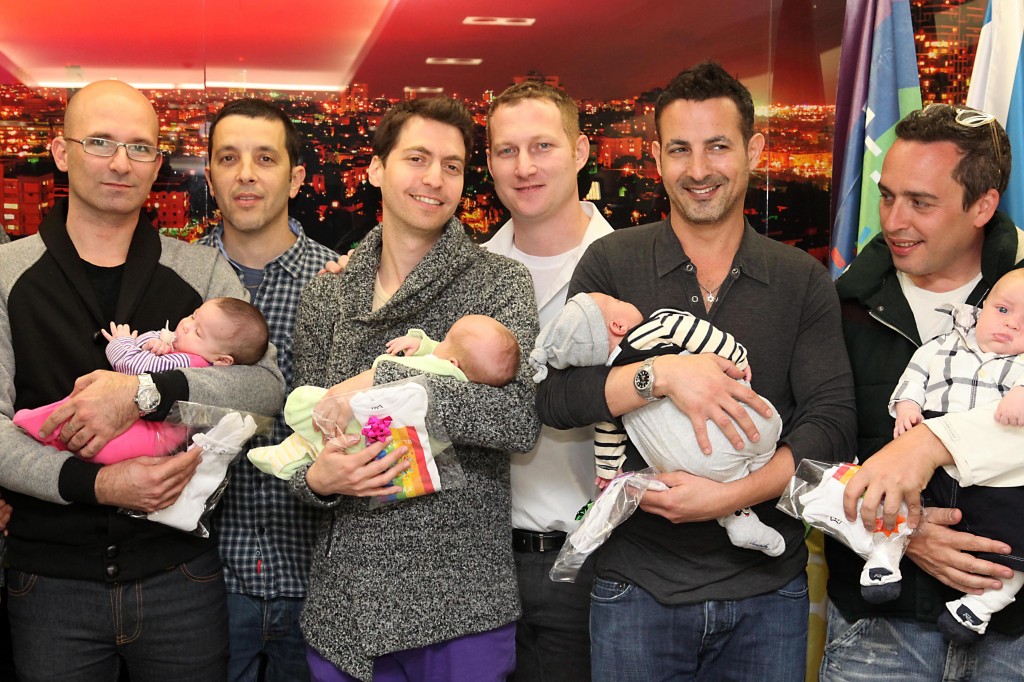
A reception for gay fathers who recently returned from Thailand, where local surrogates gave birth to their babies. Their babies having received Israeli passports after a long struggle. Photo: Gideon Markowicz / Flash90
Given the groundwork that Even and Horowitz have laid between them, the support for the LGBT community that exists in the Knesset across the political spectrum, and the fact that Israeli society is becoming ever more tolerant towards LGBT people, there is no good reason for a non-religious member of Knesset to remain in the closet in 2014. This is especially true of Mr. X who, until choosing to run for public office, lived an open life as a gay man.
Moreover, Mr. X should consider the negative consequences of his actions. When someone in the public eye chooses to come out, there is a butterfly effect helping and encouraging others in society to come out, too. By staying in the closet even when everyone knows he is gay, Mr. X is causing harm to the LGBT community, not only through his abstentions on key votes, but also by sending a dangerous message that there is a stigma attached to homosexuality, that being gay is a burden and a hindrance, something that needs to be concealed.
Nitzan Horowitz has shown and continues to show that the opposite is true: that you can be openly gay and have a great and full career in the Knesset, that you can chair the Gay Pride Lobby and be a member of the all-important Foreign Affairs and Defense Committee. Mr. X, for as long as he remains closeted, will never be Horowitz. Indeed, it might already be too late for him—in and out of the community, the damage has been done.
This paradox at the heart of the Israeli gay experience—of tolerance towards LGBT people within a society where intolerance also exists—is far from unique to Israel. It exists in all western societies where advancements have been made on LGBT rights in the last decade or two. The first same-sex marriages in France took place in May last year, but its legalization came only after a bitter struggle during which hundreds of thousands of demonstrators took to the streets of Paris in an attempt to block marriage equality.
“In Tel Aviv, it’s a common sight to see a gay couple walking hand-in-hand or kissing, but it’s very rare to see this elsewhere. In a small town, for example, it’s not well-received,” Nitzan Horowitz said. “It’s enough to go ten minutes from Tel Aviv and the situation is completely different.” Idan Matalon told me, “If Tel Aviv didn’t exist, maybe I wouldn’t live in Israel. I wouldn’t feel comfortable. In Ashdod, there’s no way that two men can kiss or hold hands. Tel Aviv is the only place in Israel for LGBT people.”
“It’s part of the complex situation here,” Horowitz continued. “It’s like there are two states: one which is tolerant, accepting, and inclusive; and the other, which is more conservative, intolerant.” Geographically and culturally, the tolerant Israel encapsulates Tel Aviv and the rest of the coastal plain, Haifa and its environs, and the kibbutzim and moshavim of the Galilee and Negev. The intolerant Israel is Jerusalem, smaller towns and villages, traditional, hardscrabble towns in the south, and certain Arab villages.
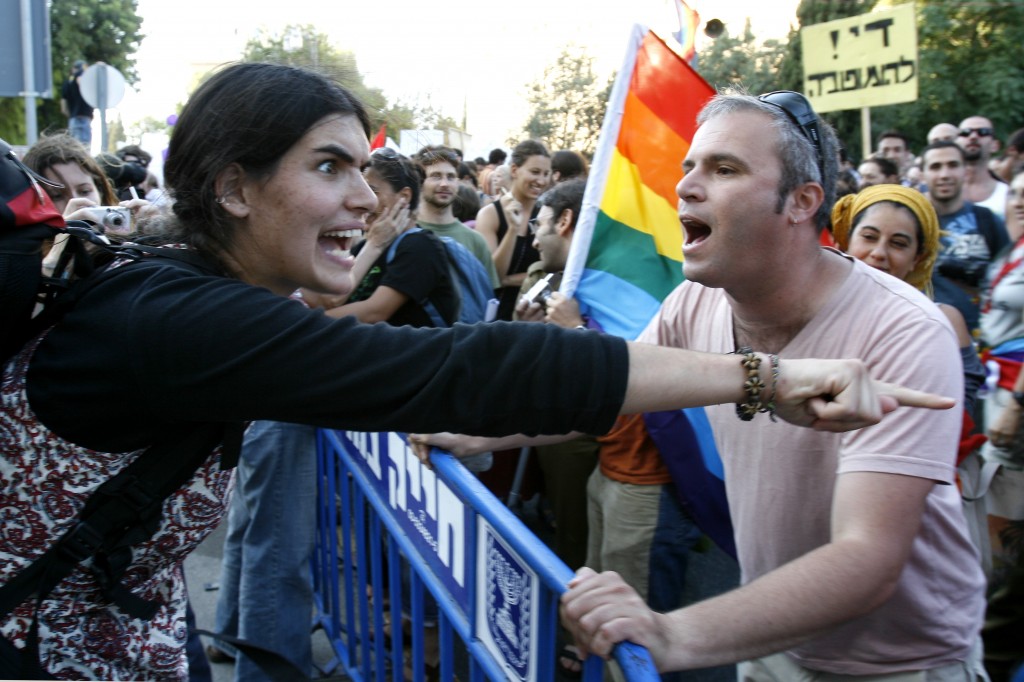
An Israeli gay man argues with a religious anti-gay protestor at the 2007 Jerusalem Gay Pride Parade. Photo: Nati Shohat / Flash90
But this idea of there being two Israels is too simplistic. It’s a construct which ignores important and significant trends among, for example datim, Orthodox Israelis, a sector that could bridge the divide between the tolerant and intolerant Israels. In recent years, a number of NGOs have been established specifically for LGBT datim, including Havruta, a social support network for religious LGBT Israelis, and Bat Kol, an Orthodox lesbian organization. Moreover, national-religious Israelis are, unlike the Haredim, an integrated part of the mainstream, serving in the military, exposed to Israeli popular culture.
Trends in the religious sector are therefore indicative of a larger problem with the “two Israels” theory. While it is possible to divide people in two between those who believe homosexually to be morally acceptable and unacceptable in any society, to say there are two Israels would be to ignore the intricate complexity of Israeli society, a society of sectors divided by ethnicity and religion which coexist alongside each other. Much as there isn’t one single Zionist dream so much as a patchwork of visions and master plans, so too is there not one version of Israeliness, but rather a spectrum of ways to be Israeli.
Within Israeli society, there are two sectors that are either isolated or have decided to isolate themselves: the Haredi sector and the Arab sector (specifically the Muslim Arab sector). These sectors live within Israel but apart from it: they have their own languages, their own schools, their own cultures that are distinct from the mainstream. They experience high levels of unemployment, do not serve in the army, and place a good deal of emphasis on traditional values and family structure. These sectors suffer most from homophobia and lack exposure to LGBT people in their everyday lives.
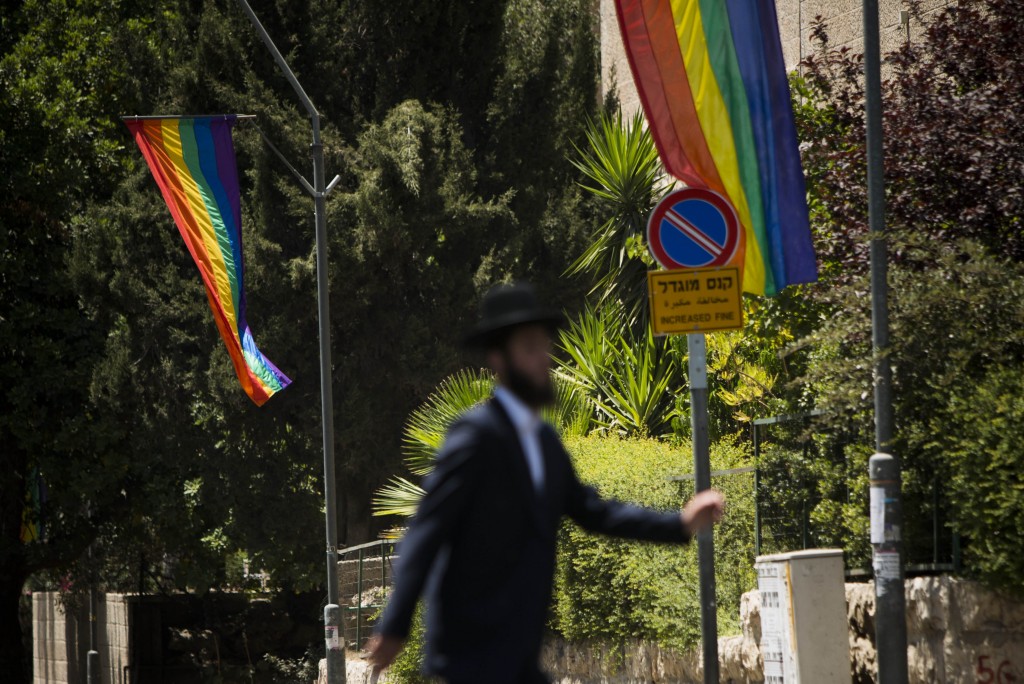
An ultra-Orthodox Jewish man passes by rainbow flags hung up by the Jerusalem municipality ahead of the 2013 Jerusalem Gay Pride Parade. Photo: Yonatan Sindel / Flash90
The Haredi and Muslim Arab sectors are “closed societies,” Gil Kol concluded. “Within these societies, particularly Muslim Arab society, it could be dangerous to be gay, and where people want to live their lives openly, they usually leave and go elsewhere in the country. The Haredi sector is like the Arab sector in that respect—maybe it wouldn’t be dangerous to be gay but it would be unacceptable, they would find themselves outside of their community.
LGBT people have been able to find their place in mainstream Israeli society, then, because the sectors where homophobia is broad and deep largely resist from engaging with the mainstream. It is not the concern of Haredim in Bnei Brak or Mea She’arim whether Assi Azar is on television or Nitzan Horowitz is a member of Knesset because they do not watch Big Brother and do not vote for Meretz. It doesn’t bother them what secular or mainstream society is up to, in theory, provided it doesn’t invade or encroach upon their ultra-conservative social space.
Similarly, while from time to time a rabbi will emerge from a yeshiva somewhere and denounce Tel Aviv as the modern incarnation of Sodom, it is not the business of the conservative political factions in the Knesset to try and alter the very nature of the city as the gay capital of Israel. Provided Tel Aviv is kept out of Mea She’arim and Mea She’arim out of Tel Aviv, LGBT and Haredi Israelis can live on the same small strip of land, relatively free of conflict and rancor.
What this goes to show, therefore, is that Israeli society is not monocultural but multicultural—and only in a multicultural society that allows room for difference can there exist spaces for gays, trans people, Muslims, and the Haredim. Where the sectors of Israeli society rub up against one another, there is discord—where they live together apart and respect one another, there is harmony.
![]()
Banner Photo: Gili Yaari / Flash90





